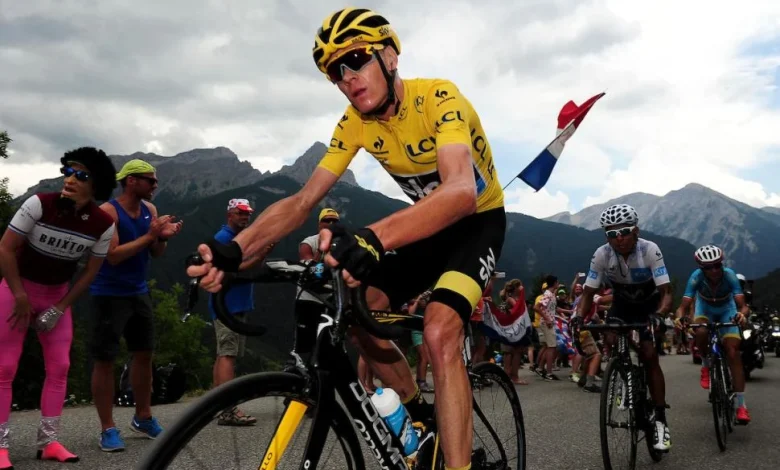Chris Froome’s retirement limbo leaves the sport of cycling to grapple with a difficult legacy

The message was short, and not particularly sweet. In an Instagram post, the team known for now as Israel-Premier Tech, wrote a two paragraph caption.
Israel Premier Tech Instagram rebrand post 14th November 2025 (credit: Israel-Premier Tech/Instagram)
The first detailed the team’s intentions to briefly go off the grid before relaunching under a new team name next year. The second was a passing reference to the riders departing the team. Derek Gee, embroiled in a legal battle with the team, was not included. But, nestled between two second and third-tier sprinters in that list, was Chris Froome.
The 40-year-old’s departure was widely expected. He was the team’s most expensive rider on a contract reported to be around €5 million a year. It was a five-year deal, signed when Froome was still the best Grand Tour racer of his generation, albeit still recovering from a life-threatening crash. His performances subsequently were regularly criticised by both pundits and his own team manager. But, for a rider of his calibre and reputation, it’s a distinctly inauspicious end to his career.
Or so we believe. Froome has been guarded over his future plans in his final contract year, but had previously suggested in 2024 he wanted to end his career at this year’s Vuelta a Espana. Then, in February this year, he told the Never Strays Far podcast that he hadn’t “100 percent decided” on retirement. He also revealed plans to set up a cycling academy in Africa. Born in Nairobi to British parents, Froome split his upbringing between Kenya and South Africa before moving to Europe to pursue his career. But such a move would require detailed planning and, if the project were to register with the UCI in 2026, various administrative decisions would have to have been made by now.
Regardless, it’s been an ignominious year for the four-time Tour de France champion. At his first race he crashed and broke his collarbone. He didn’t return until the Tour of the Alps where he finished third from last. He then raced the Tour de Suisse and the Sibiu Cycling Tour (in Romania) where, as a domestique, he helped teammate Matthew Riccitello to overall victory. His final appearance, at the Tour of Poland, was dogged by media questions over his relationship with the suspended Ineos soigneur David Rozman, and the Slovenian’s relationship with the disgraced doctor Mark Schmidt.
> Chris Froome distances himself from former carer under investigation for link to doping doctor
But then Froome suffered another serious crash whilst training, one that even made a BBC Breaking News alert. Airlifted to hospital, he was diagnosed with a broken back, five broken ribs, and a rupture to the sac lining of his heart. After a week in hospital, he was discharged.
That the crash was not necessarily the most severe of his career is testament to his fortitude, the other contender being that crash whilst recceing the Time Trial at the 2019 Criterium du Dauphine that left him fighting for his life. There he crashed into a wall, losing four pints of blood and suffering neck, femur, sternum, elbow, and rib fractures. For him to return to the professional peloton eight months later, at the age of 35, should not be underestimated. But his ‘Crash Froome’ nickname, given to him as a young pro, could never be shaken off.
Chris Froome TT crash, U23 Worlds Time Trial 2006 (credit – Nicolas Borras) (credit: road.cc)
Since posting news of his hospital release, Froome has been quiet on social media, his only activity being a public appearance at a charity gala eight weeks ago where he appeared alongside Usain Bolt, Anthony Joshua and Mika Häkkinen.
If or when a formal retirement announcement does come, it will be in the depths of an off-season and without any of the racing farewell that surrounded his compatriots. Geraint Thomas had the last stage of the Tour of Britain tailored around his life story. Mark Cavendish officially bowed out at the Tour de France before being afforded the dignity of leading over the line at the Singapore Criterium.
Geraint Thomas Mark Cavendish farewells (credit: Simon Wilkinson/SWpix.com / A.S.O./Danial_Hakim)
Assessing Froome’s career is difficult. His rise to prominence at the 2011 Vuelta he retroactively won, after years spent battling bilharzia and nearly being dropped from Team Sky, preceded a power struggle between himself and Bradley Wiggins that nearly threatened the ‘golden summer’ of British cycling in 2012. His subsequent domination of the Tour de France was emblematic of the ‘Sky era’, a period characterised by long mountain lead-out trains, relatively few attacks, and a complete demolition of his nearest rivals in the Time Trials in an era when they were still long and commonplace.
Chris Froome Dan McLay Arc de Triomphe 2016 (credit: Alex Broadway/SWpix.com)
That wasn’t to say Froome couldn’t attack. In Vuelta after Vuelta he threw everything at the purer climbers of Nairo Quintana and Alberto Contador, often without success, whilst at the Tour de France he launched devastating attacks to win on Mont Ventoux and Ax-3 Domaines in 2013.
His daring 2016 attack and stage win on the descent of the Col de Peyresourdes in 2016 was so bold the UCI later banned his ‘supertuck’ position. And then there was the 2018 Giro d’Italia, and a bold 80km solo raid that hoisted Froome into the maglia rosa that he wouldn’t relinquish.
Chris Froome Giro d’Italia stage 18 2018 (credit: SWpix.com ( t/a Photography Hub Ltd ) Peloton Photos)
Subsequent reflections on that era are very different, focusing on Team Sky’s exploitation of cycling’s grey areas, their use of Thereapeutic Use Exemptions for banned substances, the ‘Jiffygate’ scandal of unknown medicines transported to key riders at critical moments, and the striking off of former team doctor Richard Freeman.
> Damning report from MPs slams Team Sky and Sir Bradley Wiggins
Then in Froome’s case comes Salbutamol, and the relationship with Rozman. His teammate and rival Bradley Wiggins has repeatedly alluded to sinister practices, he insists ‘the truth’ is still being buried but that one day it will all come out. But more than a decade on, if these questions are not answered now, then what would it take for someone to come forward in the future?
Besides these questions, Froome’s 2019 crash and subsequent 5-year Israel-Premier Tech contract have served to change perceptions. Uncompetitive in the peloton for as long as he was all-conquering, opinions of Froome vary between a motivated, dedicated athlete still hungry to do his best despite knowing he’s not the rider he was, and a rider going through the motions, content to pick up every last cheque from his billionaire paymaster.
One recurring tongue-in-cheek meme, popular in some quarters of the internet, posits that no one has done the pro-Palestinian cause as much good as Chris Froome, draining the financial resources of an alleged Israeli sportswashing project at a time when a star athlete’s support and success would likely be most welcome for the team and the country.
On Froome’s part, since the October 7 attacks, he has remained fairly quiet on the matter of his nation state, his involvement limited to an appearance at a ‘solidarity ride’ calling for the release of Israeli hostages captured by Hamas. The same cannot be said for his wife Michelle, who last year posted highly inflammatory, Islamophobic comments on social media, that her husband’s team distanced themself from.
> Michelle Froome deletes social media account after Muslims “drain on modern society” rant, as pro-Palestine activists call for protests against Israel-Premier Tech
To include these non-sporting details in this evaluation is debatable, but they reflect the absence of any racing narrative that the Brit has been able to string together in the final years of his career. Having worked as a road captain at the Tour de France in 2021, the following year he finished 11th in an Alpine one-day race before finishing third behind Tom Pidcock and Louis Meintjes on the Tour stage to Alpe d’Huez, having made the day’s breakaway. He was sitting 26th on GC when Covid-19 forced his withdrawal during the final week. Those two sentences are the sporting highlights of the last five years of a rider who at one point was the defending champion in all three Grand Tours. The results simply don’t match.
Froome’s sporting longevity, coupled with the inevitable recency bias, overshadow the athlete he was at his best. And in not announcing his retirement during the season, the 40-year-old has denied himself the opportunity to shape the historical memory that he has created. Maybe for an outsider to the Euro-centric world of cycling like Froome, that doesn’t bother him. But as cycling’s most successful African-born cyclist by far, it is a disservice to the professional athlete he was, and all that he represents, that we lack the clarity of the athlete that he is. The athlete that he maybe still wants to be.





